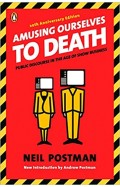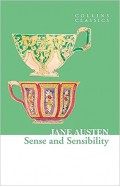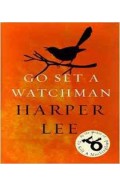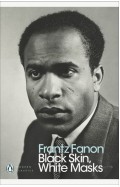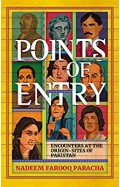The Medium is the Massage: An Inventory of Effects (Penguin Modern Classics)
By: Marshall McLuhan
-
Rs 2,155.50
- Rs 2,395.00
- 10%
You save Rs 239.50.
Due to constant currency fluctuation, prices are subject to change with or without notice.
Marshall McLuhan is the man who predicted the all-pervasive rise of modern mass media. Blending text, image and photography, his 1960 classic The Medium is the Massage illustrates how the growth of technology utterly reshapes society, personal lives and sensory perceptions, so that we are effectively transformed by the means we use to communicate. His theories, many of which are illustrated in this astonishing 'inventory of effects', force us to question how modes of communication have shaped society. This concept, and his ideas such as rolling, up-to-the-minute news broadcasts and the media 'Global Village' have proved decades ahead of their time.
How do we see the world around us? The 'Penguin on Design' series includes the works of creative thinkers whose writings on art, design and the media have changed our vision forever.
Marshall McLuhan (1911-1980) was a Canadian educator, philosopher and scholar - a professor of English Literature, a literary critic and a communications theorist. McLuhan's work is viewed as one of the cornerstones of the study of media theory. Among his other works are The Mechanical Bride (1951), The Gutenberg Galaxy (1962) and Understanding Media (1964).
Quentin Fiore (b. 1920) is a graphic designer renowned for his collaborations with writers including the academic Marshall McLuhan and the futurist and engineer Buckminster Fuller.
If you enjoyed The Medium is the Massage, you might like Bruno Munari's Design as Art, also available in Penguin Modern Classics.
'The media prophet of the 1960s'
The New York Times
'In the tumult of the digital revolution, McLuhan is relevant anew'
Wired
Marshall McLuhan is the man who predicted the all-pervasive rise of modern mass media. Blending text, image and photography, his 1960 classic The Medium is the Massage illustrates how the growth of technology utterly reshapes society, personal lives and sensory perceptions, so that we are effectively transformed by the means we use to communicate. His theories, many of which are illustrated in this astonishing 'inventory of effects', force us to question how modes of communication have shaped society. This concept, and his ideas such as rolling, up-to-the-minute news broadcasts and the media 'Global Village' have proved decades ahead of their time.
How do we see the world around us? The 'Penguin on Design' series includes the works of creative thinkers whose writings on art, design and the media have changed our vision forever.
Marshall McLuhan (1911-1980) was a Canadian educator, philosopher and scholar - a professor of English Literature, a literary critic and a communications theorist. McLuhan's work is viewed as one of the cornerstones of the study of media theory. Among his other works are The Mechanical Bride (1951), The Gutenberg Galaxy (1962) and Understanding Media (1964).
Quentin Fiore (b. 1920) is a graphic designer renowned for his collaborations with writers including the academic Marshall McLuhan and the futurist and engineer Buckminster Fuller.
If you enjoyed The Medium is the Massage, you might like Bruno Munari's Design as Art, also available in Penguin Modern Classics.
'The media prophet of the 1960s'
The New York Times
'In the tumult of the digital revolution, McLuhan is relevant anew'
Wired
The Medium is the Massage: An Inventory of Effects (Penguin Modern Classics)
By: Marshall McLuhan
Rs 2,155.50 Rs 2,395.00 Ex Tax :Rs 2,155.50
Zubin Mehta: A Musical Journey (An Authorized Biography)
By: VOID - Bakhtiar K. Dadabhoy
Rs 472.50 Rs 1,050.00 Ex Tax :Rs 472.50
The Quest For Meaning: Developing A Philosophy Of Pluralism
By: Tariq Ramadan
Rs 1,255.50 Rs 1,395.00 Ex Tax :Rs 1,255.50
Islam, Science, Muslims And Technology
By: Seyyed Hossein Nasr
Rs 720.00 Rs 800.00 Ex Tax :Rs 720.00
Amusing Ourselves to Death - Public Discourse in the Age of Show Business
By: Neil Postman
Rs 3,415.50 Rs 3,795.00 Ex Tax :Rs 3,415.50
Black Skin, White Masks - New Edition (Get Political)
By: Frantz Fanon
Rs 2,245.50 Rs 2,495.00 Ex Tax :Rs 2,245.50
Points of Entry Encounters at the Origin Sites of Pakistan
By: Nadeem Farooq Paracha
Rs 1,525.50 Rs 1,695.00 Ex Tax :Rs 1,525.50
Darker: 'fifty Shades Darker' As Told By Christian
By: E L James
Rs 1,345.50 Rs 1,495.00 Ex Tax :Rs 1,345.50
Summer Brain Quest: For Adventures Between Grades Pre-K & K
By: Workman Publishing
Rs 4,315.50 Rs 4,795.00 Ex Tax :Rs 4,315.50
The Quest For Meaning: Developing A Philosophy Of Pluralism
By: Tariq Ramadan
Rs 1,255.50 Rs 1,395.00 Ex Tax :Rs 1,255.50
Islam, Science, Muslims And Technology
By: Seyyed Hossein Nasr
Rs 720.00 Rs 800.00 Ex Tax :Rs 720.00
Amusing Ourselves to Death - Public Discourse in the Age of Show Business
By: Neil Postman
Rs 3,415.50 Rs 3,795.00 Ex Tax :Rs 3,415.50
No recently viewed books available at the moment.
Zubin Mehta: A Musical Journey (An Authorized Biography)
By: VOID - Bakhtiar K. Dadabhoy
Rs 472.50 Rs 1,050.00 Ex Tax :Rs 472.50
The Medium is the Massage: An Inventory of Effects (Penguin Modern Classics)
By: Marshall McLuhan
Rs 2,155.50 Rs 2,395.00 Ex Tax :Rs 2,155.50
The Quest For Meaning: Developing A Philosophy Of Pluralism
By: Tariq Ramadan
Rs 1,255.50 Rs 1,395.00 Ex Tax :Rs 1,255.50
Islam, Science, Muslims And Technology
By: Seyyed Hossein Nasr
Rs 720.00 Rs 800.00 Ex Tax :Rs 720.00
Amusing Ourselves to Death - Public Discourse in the Age of Show Business
By: Neil Postman
Rs 3,415.50 Rs 3,795.00 Ex Tax :Rs 3,415.50












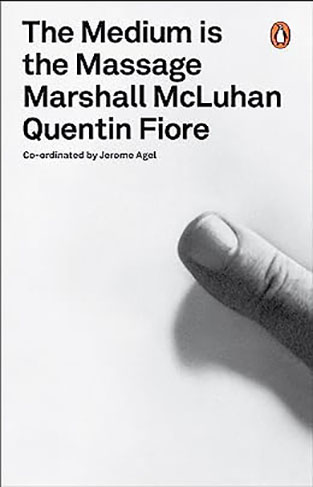
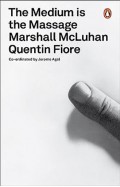
-120x187.jpg?q6)










